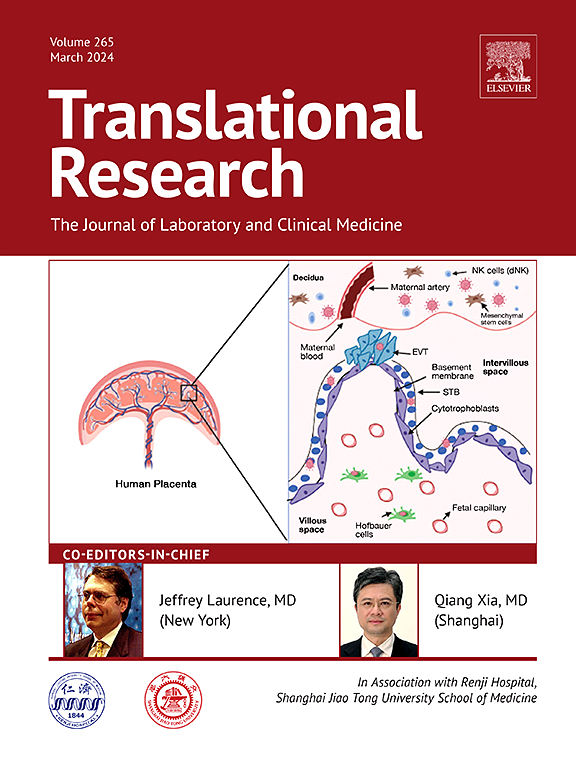老年治疗药物对克罗恩病肠道菌群失调和肠道炎症的影响:一项初步研究
IF 6.4
2区 医学
Q1 MEDICAL LABORATORY TECHNOLOGY
引用次数: 0
摘要
炎症性肠病(IBD)以胃肠道慢性炎症为特征,通常伴有肠道微生物群的生态失调,这是导致疾病进展的一个因素。肠道微生物群失调导致活性氧(ROS)的过量产生——ibd的标志性特征之一——会促进慢性炎症,并促进正常细胞向衰老细胞的转化。细胞衰老与各种慢性和年龄相关疾病的发展有关。我们假设,抗衰老药物,特别是达沙替尼(D)和槲皮素(Q),可能对IBD的肠道微生物群和肠道细胞都有有益的影响。在M-SHIME模型中评估D + Q组合的调节作用,该模型使用来自克罗恩病患者的粪便微生物群。D + Q可显著调节特定患者样品中的丁酸盐和乳酸水平。此外,代谢组学分析显示,D + Q正影响抗炎细菌的丰度,同时也显著减少了几种致病菌。来自IBD Caco-2细胞/THP1共培养模型的研究结果表明,D + Q对肠道上皮具有很强的免疫调节作用,其证据是NF-kB活性降低,促炎标志物TNF-α、CXCL-10和MCP-1水平降低。此外,D + Q诱导抗炎细胞因子IL-6和IL-10的分泌。但需要注意的是,D + Q也导致促炎细胞因子IL-8的分泌。这些发现表明,D + Q可以通过调节肠道微生物群和炎症途径,为晚期IBD治疗提供一种新的治疗方法。这些结果支持将老年治疗药物作为解决IBD发病机制中心慢性炎症的一种策略本文章由计算机程序翻译,如有差异,请以英文原文为准。

Effects of senotherapeutics on gut microbiome dysbiosis and intestinal inflammation in Crohn's disease: A pilot study
Inflammatory Bowel Disease (IBD) is characterized by chronic inflammation in the gastrointestinal tract, and is usually accompanied by dysbiosis in the gut microbiome, a factor that contributes to disease progression. Excessive production of reactive oxygen species (ROS) because of gut microbiome dysbiosis—one of the hallmark features of IBD—promotes chronic inflammation and facilitates the transformation of normal cells into senescent cells. Cellular senescence is associated with the development of various chronic and age-related diseases. We hypothesise that senolytic agents, specifically dasatinib (D) and quercetin (Q), could have a beneficial effect on both the gut microbiome and intestinal cells in IBD. The modulatory effects of a combination of D + Q was assessed in the M-SHIME model with faecal microbiota sourced from Crohn's disease patients. D + Q significantly modulated butyrate and lactate levels in the samples from specific patients. In addition, metabolomic analysis showed that D + Q positively impacted the abundance of anti-inflammatory bacteria while also significantly reducing the several species of pathogenic bacteria. Findings from a Caco-2 cell/THP1 co-culture model of IBD demonstrated that D + Q exerted strong immunomodulatory effects on the gut epithelium, evidenced by reduced NF-kB activity, and lower levels of the pro-inflammatory markers TNF-α, CXCL-10, and MCP-1. Furthermore, D + Q induced the secretion of anti-inflammatory cytokines, including IL-6 and IL-10. However, it should be noted that D + Q also led to the secretion of the pro-inflammatory cytokines IL-8. These findings suggest that D + Q could offer a novel therapeutic approach for advanced IBD management by modulating both the gut microbiome and inflammatory pathways. The results support the potential repurposing of senotherapeutic agents as a strategy for addressing the chronic inflammation central to IBD pathogenesis
求助全文
通过发布文献求助,成功后即可免费获取论文全文。
去求助
来源期刊

Translational Research
医学-医学:内科
CiteScore
15.70
自引率
0.00%
发文量
195
审稿时长
14 days
期刊介绍:
Translational Research (formerly The Journal of Laboratory and Clinical Medicine) delivers original investigations in the broad fields of laboratory, clinical, and public health research. Published monthly since 1915, it keeps readers up-to-date on significant biomedical research from all subspecialties of medicine.
 求助内容:
求助内容: 应助结果提醒方式:
应助结果提醒方式:


